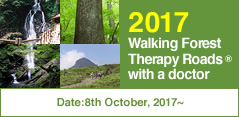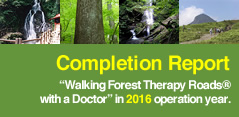A new report on Forest Medicine from Harvard University
Last Updated:November 28, 2014
At the invitation of the Center for Health and the Global Environment at the Harvard School of Public Health, a group of 20 international experts in medicine, landscape architecture, public health, psychology and forestry science convened in Boston, MA, in the autumn of 2013. This collaborative working group was formed to evaluate the potential value of natural environments for human health, identify the emerging trends in research, and clarify challenges to implementation (“translation and transmission”). Within the working group, the diverse representation of professional backgrounds with unique expertise in specific fields related to natural environments helped overcome differences of disciplinary culture and practice.
The Natural Environments Initiative: Illustrative Review and Workshop Statement (www.chgeharvard.org/NEI_Paper) reflects the conversations and themes explored during the meeting. The working group identified Five Action Areas for further consideration by international planners, policy makers, design and healthcare professionals. A summary Workshop Statement suggests basic strategies for health promotion captured by the acronym “AIM:” Advocate (access to nature for health), Invest (in equitable access), and Mediate (engage in translation between disciplines to build support beyond the health sector).
Although much research is still needed to understand implications of exposure to natural environments in the context of conventional healthcare practice, available evidence indicates that nature supports individual and population level health. The potential value of natural environments becomes magnified given increasing urbanization, climate change, and rising rates of global non-communicable diseases. The Natural Environments Initiative is a working group paper that explores how we can—and should—integrate natural elements into city plans to support public health while also providing “ecosystem services,” or the contributions of natural elements to the quality of human life. The paper is intended for urban planners, landscape architects, health clinicians, and community members interested in forming strategic alliances and agendas using evidence-based insights into healthy green spaces. The group invites your participation in bringing the concepts into action, as well as your thoughtful commentary.
- The Natural Environments Initiative: PDF DOWNLOAD


